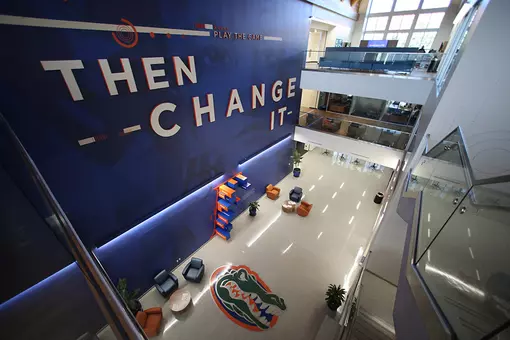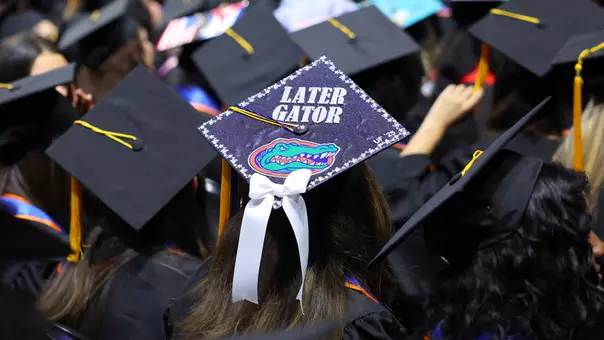Norm Carlson Looks Back.. - Dr. Ruth Alexander
Tuesday, June 1, 2004 | General
 Dr. Ruth Alexander, the mother of the women's intercollegiate athletic program at the University of Florida in 1972, retires this June. Appropriately, she will also be inducted into the Sports Hall of Fame for the State of Florida this month.
Dr. Ruth Alexander, the mother of the women's intercollegiate athletic program at the University of Florida in 1972, retires this June. Appropriately, she will also be inducted into the Sports Hall of Fame for the State of Florida this month.
Her dogged determination, patience and vision took competitive sports for women at UF from the intramural and club sports level to varsity status right next to men's programs that existed since 1906 in Gainesville. She never made it a "men's sports vs. women's sports" issue, but she also never backed down when it came time to help women students have an opportunity to compete in intercollegiate athletics.
She was named Chairman of the department of physical education for women at Florida in August of 1968, while also teaching in the College of Physical Education. She continued these duties until 1976, when, with the reorganization of the College of Physical Education, she became a full-time professor.
Dr. Alexander's interest in intercollegiate athletics increased as she watched what was going on at Florida in terms of athletic competion for female students, who comprised over 40 percent of the student body in 1970. Her Oral History Program interview provides insight into her thoughts.
"Women had the traditional activities available for them," she said. "Like sorority life (and) musical opportunities. Musical opportunities always included both sexes, especially women. But there were no intercollegiate athletics. There was a little opportunity in extramural clubs. Women's golf and women's tennis had been able to travel to some semi-national kinds of things. Then our (club) teams played the other Florida schools, including Florida State, Rollins, South Florida and a few of those. But that was the limited activity for women, the way it kind of was throughout the United States.
"Women were getting very restless about this. They had shown a very fine level of skill and enthusiasm for sports and a need to compete with different schools in different geographical locations. There was a keen interest and desire there for women to do more in athletic competition."
Dr. Alexander and her faculty cohorts in the women's PE department were ahead of the curve on Title IX.
"Title IX was not heard of yet when the University of Florida approved officially from its committee on intercollegiate athletics and athletic program for women in March of 1972 for the coming year, " said Dr. Alexander. "Title IX came after that, about three months after that."
Most of the women staff members in the PE department were already working with women's extramural teams in some capacity, according to Dr. Alexander. One worked with tennis, one with swimming. Another worked with golf and some of the graduate assistants worked with other team sports. Several of these coaches, notably Mimi Ryan and Paula Welch, urged Alexander to approach Gator athletic director Ray Graves to see if he would help fund a program for women students.
This had never been done at a Southeastern Conference school.
"Ray Graves said that by the logistics of his position with the budget approval process, he could not fund anybody for whom the board had not approved funding," said Alexander."We said, 'well, let's talk to whoever it is that heads the committee.' "
The head of the committee was UF President Stephen C. O'Connell, so Dr. Alexander wrote him a letter about a desire to start an intercollegiate athletic program for women in sports, informing him that women leaders on campus wanted some funding and some support, and would like to talk to the people involved with approving that request.
Alexander, Ryan and Welch then met with Graves, athletic faculty representative Mandy Glicksberg, athletic board chairman Bill Elmore and President O'Connell. After explaining where women's athletics stood at UF, and what their vision was for the future, they got the answer they relished.
President O'Connell, always a man who was willing to take a stand for what he believed to be right, told the group, "We will do it. We will take a stand, and we will do it." When he presented the proposal to the athletic board it was passed unanimously. They sent Dr. Alexander a letter asking her to prepare a budget and get started.
"I always think about President O'Connell," recalls Dr. Alexander. "It was just very questionable for us to make such a proposal for women's athletics. We never had it. The possibility of being turned down was there. We never had it; why should they do it now? You walk over there (to Tigert Hall) and you are nervous and scared, but you want it. You kind of keep your fingers crossed. He just listened and said, ' We will have it'-kind of like it was God talking."
In the fall of 1972 the women's program started with five teams-golf, tennis, swimming, track and gymnastics. The total budget was $16,000.
"I requested the budget of $16,000, and it was approved," said Dr. Alexander. "We thought we were the wealthiest people in town. It was a tremendous amount of money. (The) next year we had $36,000.By 1974 we had a budget of about $65,000. We had about eight sports going. We did well. With eight sports, six of them wound up every year in the top ten (in the nation). We were not only excelling skillwise, but budgetwise, and in administrative structure. Everything was in excess of anybody else in the nation. Ray Graves and I got along well. I think Ray was very good-hearted. If he had the money he would distribute it fairly.
"Title IX came in 1972, and the guidelines were signed in 1975. Schools were given until 1978 to be in compliance, so we were working ahead. We were not anywhere near where we should have been, but we were ahead of the other schools in Florida and all of the schools in the Southeast. We were producing teams that performed nationally."
Dr. Alexander was in charge of women's intercollegiate athletics from its inception in 1972 until 1981. She called herself a "coordinator" because she didn't want the title of athletic director. During this period she continued to teach classes, and finally decided to concentrate on the teaching and fitness aspects of her career. When she retired as the women's athletics coordinator the program had grown to eight sports, many of which were consistently ranked in the nation's top five. The women's swimming team won the national championship in 1979.
The women's athletics program's solid foundation enabled it to continue to progress under Ann Marie Rogers and is annually ranked in the nation's top ten What Dr. Ruth Alexander envisioned 32 years ago has come to pass. Upon Rogers' retirement in December of 2003, the reigns were handed to Linda Tealer, the new associate athletic director guiding women's intercollegiate athletics for the Gators.
Norm Carlson recently retired from the University Athletic Association after 40 years of service. Carlson serves as historian for Gator athletics and will contribute a regular column to gatorzone.com.







